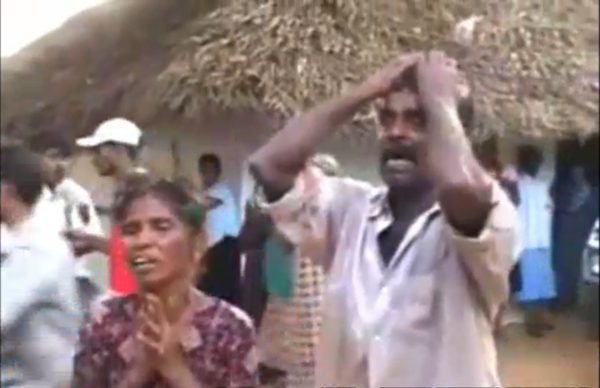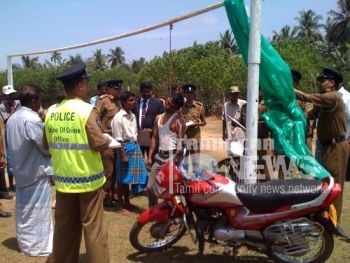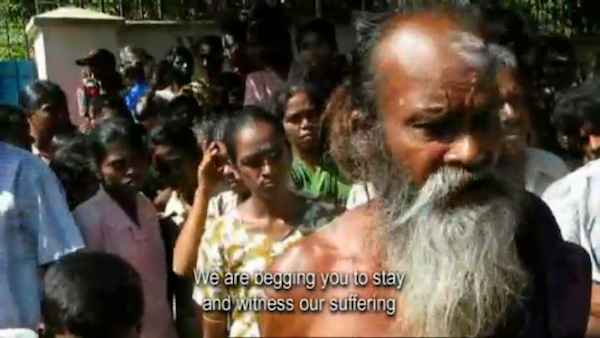 The Washington Post's world news
The Washington Post's world news
 COLOMBO, Sri Lanka — Hundreds of people protested Thursday demanding to know the whereabouts of their family members abducted by “white van squads” allegedly operated by the Sri Lankan government during the height of the country’s civil war.
COLOMBO, Sri Lanka — Hundreds of people protested Thursday demanding to know the whereabouts of their family members abducted by “white van squads” allegedly operated by the Sri Lankan government during the height of the country’s civil war.The protesters said they have not heard from their sons or husbands since they were bundled into often white-colored vehicles or surrendered to the army over involvement with the now-defeated Tamil Tiger rebels.
 Ramakrishnan Lalitha held the photographs of her two sons, Prathapan and Jegarupan, who were taken away on the same day in 2008 by men who identified themselves as navy personnel in the eastern port town of Trincomalee.
Ramakrishnan Lalitha held the photographs of her two sons, Prathapan and Jegarupan, who were taken away on the same day in 2008 by men who identified themselves as navy personnel in the eastern port town of Trincomalee.“My sons were at home, and some men came in and showed their navy identity cards and took my sons away saying they needed to be questioned,” Lalitha said. She has not heard from her sons since.
Elarin Indrani said her son Mathew was taken away in 2007 by four masked men who arrived in a white van.
“They must identify the four men who took my son away. Only then we will know who gave the orders,” she said.
Parents and relatives say their complaints and appeals to security authorities and foreign governments have been futile. Full Story>>>
On Sri Lanka, Ban Won't Push to Get UN Heyns In, Have Been Given Killing Fields, Will Watch if Has Time, Ranil on July 5?
By Matthew Russell Lee
UNITED NATIONS, June 30 -- Despite UN Secretary General Ban Ki-moon's statements that he is “checking every day” to see if the government of Mahinda Rajapaksa in Sri Lanka has deigned to respond to the UN Panel of Experts report documenting war crimes, there is very little follow-through.
On June 30 Inner City Press asked Ban's acting deputy spokesman Farhan Haq if Ban has done anything about Sri Lanka blocking the visit requested by UN Special Rapporteur on extrajudicial executing Christof Heyns, who has said “I have asked to visit Sri Lanka, but this has so far been denied.”
Haq couldn't not say anything that Ban has done or even tried to do in this regard, instead “referring” the questions to the Office of the High Commissioner for Human Rights in Geneva.
Heyns authenticated video used in the Killing Fields documentary, saying that the “video that I have examined in detail shows textbook examples of extrajudicial killings -- naked, blindfolded people whose hands are tied, are being shot through the head by people in military uniform. They speak Sinhalese. This clearly raises major concerns that cannot be ignored by someone tasked to investigate arbitrary executions.”
For more than two weeks Inner City Press has asked Ban's spokespeople if he has taken the time to see the Killing Fields video. Full Story>>>

 groundviews journalism For citizens
groundviews journalism For citizens 

 Published: Wednesday, Jun 29, 2011, 20:29 IST
Published: Wednesday, Jun 29, 2011, 20:29 IST 






 By Kshama Ranawana
By Kshama Ranawana 
 June 29, 2011 By Guest Writer Raj Palanisamy.
June 29, 2011 By Guest Writer Raj Palanisamy.





 In an email answer to a question from journalists regarding accountability in Sri Lanka, the State Department spokeswoman Victoria Nuland said, “While domestic authorities have primary responsibility to ensure that those responsible for violations of international humanitarian law and human rights law are held accountable, international accountability mechanisms can become appropriate in circumstances in which a State is unable or unwilling to meet its obligations.”
In an email answer to a question from journalists regarding accountability in Sri Lanka, the State Department spokeswoman Victoria Nuland said, “While domestic authorities have primary responsibility to ensure that those responsible for violations of international humanitarian law and human rights law are held accountable, international accountability mechanisms can become appropriate in circumstances in which a State is unable or unwilling to meet its obligations.” Tuesday 28 of June 2011
Tuesday 28 of June 2011


 26 June, 2011
26 June, 2011








